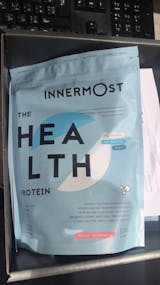We’re not sure about you, but recently, it seems like everyone is obsessed with ‘getting their steps in’. We’re not mad about it, as here at Innermost we love to encourage people to have healthy fitness goals that they’re working towards, but it got the team here wondering… why 10,000 steps a day? Where did this goal and recommendation come from?
Surely, right? All movement is good movement, after all. If you’re looking to tone up, lose weight and up your stamina, this challenge could be for you. The Tone Capsules could be, too.
The 10,000 steps per day challenge
Invented in 1960, the 10,000 steps per day challenge was first conceptualised in the 1960s. It derives from the branded name of a pedometer sold called “Manpo-kei”, in Japan, which translates to ’10,000 steps supplied’. The rest was history.
Why 10,000 steps per day?
Aside from being a great competitive metric and the ultimate motivation to get you up and moving, the 10,000 step recommendation isn’t just another fad trend. It’s now even been endorsed by the World Health Organisation… and it’s hard to argue with them. They kind of know what they’re talking about.
Notable charities have also adopted the challenge to raise funds and awareness for their cause, including the Walk All Over Cancer campaign implemented by Cancer Research UK. The challenge requires supporters to walk 10,000 steps a day for a month, citing the following benefits:
- Walking lowers blood pressure
- Walking is great for your mental health
- Walking can improve your overall fitness
10,000 steps a day for a month straight equates to 150 miles, too! But what does that mean day-by-day? Let’s take a look.
10,000 steps: the metrics
So, now we know that walking 10,000 steps is pretty beneficial after all, we thought it would be interesting to check out the metrics around walking 10,000 steps. We’re talking about the all important questions: how many calories is 10,000 steps, how long does it take to walk 10,00 steps, and what is 10,000 steps in miles? All highly important questions, obviously.
How long does it take to walk 10,000 steps?
Let’s start with perhaps the most burning question of them all. Time is precious, we know that, so it’s all about finding out what the most efficient way to walk 10,000 steps would be.
Maybe you want to stretch it out throughout your day, or maybe you want to smash out your 10,000 steps all at once! And either is fine.
In answer to your question, it would take the average person around 90 minutes (an hour and a half) to get 10,000 steps in in one go. The absolute perfect excuse to get out the house during that next football game on a Sunday, am I right?
How many calories does 10,000 steps burn?
The answer to this question is slightly more ambiguous. Calories burnt depends on several factors, but, if you were to walk briskly (aka, not jog, but not a slow slump either) for around thirty minutes, you can burn around 400 calories. Nice work!
What is 10,000 steps in miles?
Again, this depends on factors such as stride length and overall fitness level, but on average it takes around 2,000 steps to walk a mile. So let’s call 10,000 steps around 5 miles. Not a bad shift!
If you’re trying to get your daily steps up to 10,000 and have some time to burn, why not work out the average distance to your local store (or maybe one a tiny bit further away?). If there and back, the round trip totals up to around 5 miles, you’ve got your steps in… and your bread, cheese and milk, all in one. Can’t complain with that one.
What is 10,000 steps in kilometres?
If you don’t work in miles and want to know how long that is in kilometre, don’t worry, we’ve got you. Five miles is around eight kilometres. Some good training for the upcoming local 10k fun run!
How can I track my 10,000 steps a day?
Tracking your steps has never been simpler. In fact, anyone with a smartphone will have been tracking their steps (subconsciously) since the day you started using it!
Whilst our phones are somewhat glued to our hands at all points of the day it seems, one time in which this isn’t true is at the gym, and this is where fitness watches come in. Whichever brand you opt for, all of the mainstream fitness watches will have a step-tracking feature installed so that you can work your way to 10,000 steps with ease.
Our top tips for walking 10,000 miles in a day
Now you know just how far 10,000 steps is (five miles, just in case you’d forgotten already), you might be after some tips and tricks for getting to that all-important 10,000 step mark. Especially if you want to break this goal up throughout your day.
Here’s some inspiration to get you going:
- Walk and talk on the phone (but remember to watch where you’re going)
- Go the wrong (or the long) way
- Take the stairs (don’t be lazy, now!)
- Walk, don’t drive
- Set an alarm to get yourself moving every thirty minutes
- Take the dog for an extra walk each day (they’ll love you for it)
- Park further away than necessary
- Add steps to your daily chores
- Start and end your day with a walk around the neighbourhood
Here's what the studies have to say
Don't just take our word for it: the science backs us up, too. A meta analysis recently published in Science Daily reviewed 15 studies that had investigated the impact of a daily step-count and the benefits of the strategy.
Reviewing the results of studies that covered over 50,000 people, this meta analysis into daily step count conducted by the University of Massachusetts Amherst found that the number of steps you walk a day does in fact have a positive impact on your health.
The interesting part? That optimum number changes depending on your age. Yes, really.
The younger you are, the more steps you should be doing. Of course, taking your abilities into account, those in the groups who got a greater number of steps in in a day saw a much lower risk of death (of up to nearly 50%), compared to those who walked fewer steps.
Summary
Looks like a pretty good recommendation after all, right? Let us know how you get on with your 10,000 steps a day challenge over on our Instagram @liveinnermost. We'd love to hear from you!
References
- University of Massachusetts Amherst. (2022, March 3). Meta-analysis of 15 studies reports new findings on how many daily walking steps needed for longevity benefit: Spoiler alert: It’s fewer than 10,000, especially for older adults. ScienceDaily. Click here.
























